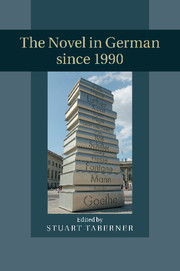Book contents
- Frontmatter
- Contents
- Contributors
- Acknowledgements
- Introduction: The novel in German since 1990
- Chapter 1 Robert Schindel???s Geb??rtig (Born-Where)
- Chapter 2 G??nter Grass???s Ein weites Feld (Too Far Afield)
- Chapter 3 Thomas Brussig???s Helden wie wir (Heroes Like Us)
- Chapter 4 Christa Wolf???s Medea. Stimmen (Medea. A Modern Retelling)
- Chapter 5 Zafer ??enocak???s Gef??hrliche Verwandtschaft (Perilous Kinship)
- Chapter 6 Monika Maron???s Endmor??nen (End Moraines)
- Chapter 7 Martin Walser???s Ein springender Brunnen (A Gushing Fountain)
- Chapter 8 Michael Kleeberg???s Ein Garten im Norden (A Garden in the North)
- Chapter 9 Christian Kracht???s Faserland (Frayed-Land)
- Chapter 10 Elfriede Jelinek???s Gier (Greed)
- Chapter 11 Karen Duve???s Dies ist kein Liebeslied (This Is Not a Love-Song)
- Chapter 12 Herta M??ller???s Herztier (The Land of Green Plums)
- Chapter 13 W. G. Sebald???s Austerlitz
- Chapter 14 Walter Kempowski???s Alles umsonst (All for Nothing)
- Chapter 15 F. C. Delius???s Mein Jahr als M??rder (My Year as a Murderer)
- Chapter 16 Yad?? Kara???s Selam Berlin
- Chapter 17 Daniel Kehlmann???s Die Vermessung der Welt (Measuring the World)
- Chapter 18 G??nter Grass???s Beim H??uten der Zwiebel (Peeling the Onion)
- Select bibliography
- Index
- References
Chapter 5 - Zafer ??enocak???s Gef??hrliche Verwandtschaft (Perilous Kinship)
Published online by Cambridge University Press: 07 September 2011
- Frontmatter
- Contents
- Contributors
- Acknowledgements
- Introduction: The novel in German since 1990
- Chapter 1 Robert Schindel???s Geb??rtig (Born-Where)
- Chapter 2 G??nter Grass???s Ein weites Feld (Too Far Afield)
- Chapter 3 Thomas Brussig???s Helden wie wir (Heroes Like Us)
- Chapter 4 Christa Wolf???s Medea. Stimmen (Medea. A Modern Retelling)
- Chapter 5 Zafer ??enocak???s Gef??hrliche Verwandtschaft (Perilous Kinship)
- Chapter 6 Monika Maron???s Endmor??nen (End Moraines)
- Chapter 7 Martin Walser???s Ein springender Brunnen (A Gushing Fountain)
- Chapter 8 Michael Kleeberg???s Ein Garten im Norden (A Garden in the North)
- Chapter 9 Christian Kracht???s Faserland (Frayed-Land)
- Chapter 10 Elfriede Jelinek???s Gier (Greed)
- Chapter 11 Karen Duve???s Dies ist kein Liebeslied (This Is Not a Love-Song)
- Chapter 12 Herta M??ller???s Herztier (The Land of Green Plums)
- Chapter 13 W. G. Sebald???s Austerlitz
- Chapter 14 Walter Kempowski???s Alles umsonst (All for Nothing)
- Chapter 15 F. C. Delius???s Mein Jahr als M??rder (My Year as a Murderer)
- Chapter 16 Yad?? Kara???s Selam Berlin
- Chapter 17 Daniel Kehlmann???s Die Vermessung der Welt (Measuring the World)
- Chapter 18 G??nter Grass???s Beim H??uten der Zwiebel (Peeling the Onion)
- Select bibliography
- Index
- References
Summary
In the early 1990s, the phase of political and socio-economic uncertainty following the seismic shifts of 1989–90 had brought numerous outbreaks of xenophobic violence in Germany. In 1993, the year that five members of one Turkish family died in an arson attack in Solingen, writer Zafer Şenocak and political scientist Claus Leggewie co-edited the bilingual anthology Deutsche Türken/Türk Almanlar: Das Ende der Geduld/Sabrın sonu (German Turks: The End of Patience). While this does not make Şenocak (any more than Leggewie, of course), a spokesman or representative of ‘German Turks’, it underlines his determined intervention in debates on migration, ethnicity, belonging and exclusion that had acquired a bloody contemporaneity.
Five years later, in 1998, Şenocak’s novel Gefährliche Verwandtschaft (Perilous Kinship, 1998) returns to these same early 1990s, to the recently united Germany and to Berlin, soon to be reinstated as the country’s capital, to explore these themes in a novel whose allusive complexities have provoked multiple contradictory interpretations. The novel’s narrator, Sascha Muchteschem, born in Munich to a bourgeois Turkish father and a German-Jewish mother, inherits from his recently deceased parents a silver casket containing the twenty notebooks of his Turkish paternal grandfather from the years 1916–36. They hold, he feels sure, the key to an obscure and obscured portion of his family’s history. Will they perhaps explain his grandfather’s mysterious suicide in the latter year, when as a senior Turkish official he was about to accompany the national team to the Berlin Olympics? Will they shed light on his grandfather’s military career, indeed his possible implication in the Turkish deportations and massacres of Armenians during and after the First World War? However, neither Sascha nor his narrative seems in any hurry to answer these questions, and the novel is not about their resolution, but about questions these questions pose in their turn: questions of memory, history, identity, guilt, fact and fiction.
- Type
- Chapter
- Information
- The Novel in German since 1990 , pp. 79 - 93Publisher: Cambridge University PressPrint publication year: 2011



